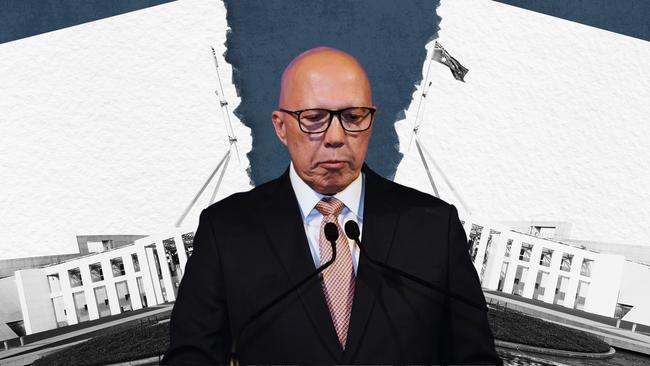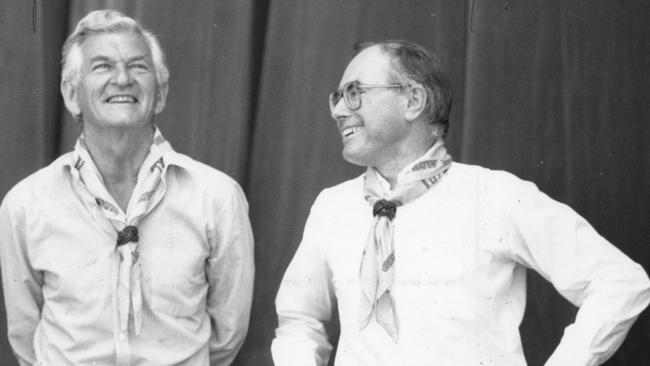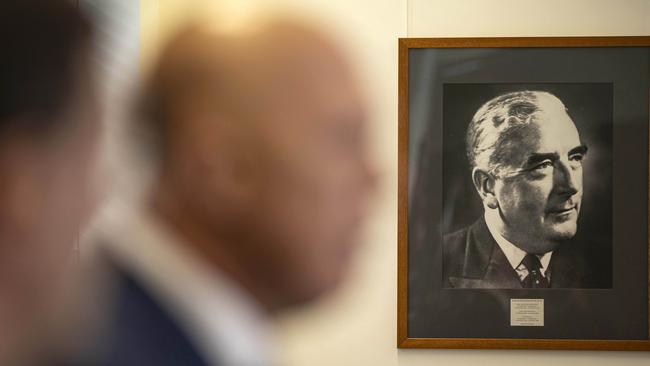
Democratic politics is a perpetual lesson in disappointment, invariably creating nearly as many losers as winners. But for those who hoped for a different outcome, last week’s result was worse than a let-down – it was a disaster.
Yes, Donald Trump’s chaotic policies contributed, inducing a preference for the devil one knows. And yes, the Liberal campaign was ill-judged in conception and inept in execution. But Labor’s campaign was scarcely brilliant, nor could anyone claim Anthony Albanese exudes the charisma of a Bob Hawke.
It was therefore hard, watching Liberal seats crumble, not to be reminded of Montesquieu’s dictum that when a single blow fells a seemingly mighty structure, deep causes are surely at work.
What shattered the Liberals was, in other words, not like a cyclone, which emerges from the transient convergence of meteorological factors. It was an earthquake, releasing energies built up by the long-term grating of tectonic plates.
The numbers are telling. Over the past two decades, the Coalition has lost nearly a third of its electorate. Additionally, because of the distribution of the losses, successive reductions in its primary vote have exacted a rising toll in terms of seats.
On average, over the period from 1990 to 2022, a one percentage point fall in the Coalition’s vote reduced its share of MPs by 1.8 per cent; but in this election, the Coalition’s share of MPs fell by 2.7 per cent for each percentage point decline in its primary vote share, causing it to lose six more MPs than it otherwirse would have. Were that trend to continue, marginalisation awaits.
To that extent, what we are witnessing – especially given the situation in the states – is the entrenchment of Labor, and more generally of the “progressive” mindset, as a hegemonic force.
Now, the concept of hegemony is notoriously slippery. The abstract noun “hegemonia” first appears in Herodotus, designating leadership based on respect. But when German philologists resurrected it in the 19th century, the distinction between consensual “hegemonia” and its more coercive counterpart, “arkhe”, had disappeared. Adopted by Lenin (a talented classicist), it was as a synonym for coercive domination that hegemony entered the Comintern’s lexicon.
However, the failure, immediately after World War I, of the attempted communist revolutions in Europe led the Italian Marxist Antonio Gramsci to use it in his Prison Notebooks to denote the “spontaneous consent given by the great masses of the population to the general direction imposed on social life by a dominant group” – a consent based on the assimilation, virtually by osmosis, of “outlooks and moral standards” that constrained the permissible scope of disagreement.
Sustained by the ruling elite’s predominance in the media, education and religion, those perceptions shaped the “common sense” of even harshly oppressed peasants and manual labourers, making support for the dominant group the default option. The result was to place challengers on the back foot, struggling to overcome suspicion, demonisation and distrust.
Yet Gramsci never thought that the ruling group’s hegemony was unshakeable. Disputing Aristotle’s assertion that it resulted in a society in which “all men either sound the same note or else different notes in the same key”, he stressed the “contradictory consciousness” of the victims, who – in Etienne de la Boétie’s (1530-1563) famous phrase – had “not lost their freedom but chosen their servitude”.

In that “contradictory consciousness” passive acceptance of the dominant worldview coexisted with “apathy, grudging resignation and outright hostility”, fomenting periodic rebellions. Those rebellions could, like an occasional Coalition state government, act as safety valves for the regime’s accumulated contradictions or, like the voice referendum, as checks on its excesses. In those ways, the rebellions helped perpetuate the hegemony, rather than weakening it.
But the fissures in the hegemonic order were also the cracks its opponents could exploit to wrench its foundations apart.
Compounding that potential were the vulnerabilities inherent in any long ruling elite, which Gramsci analysed by examining the caste that dominated Italian politics from unification in 1861 to the triumph of fascism in 1922. To durably retain its power, that caste had to assemble an extremely heterogeneous coalition, internalising, and seeking to resolve, a wide array of conflicts. However, that exposed it to endless demands for greater favours, forcing it to place growing burdens on subaltern groups.
And “as soon as the dominant class exhausted its function” – that is, its capacity to “expand the productive forces” to underwrite the demands it sought to appease – “its ideological hold decayed”, with increasingly bitter battles over shares of the pie weakening it further.
The relevance to Australia, where Labor’s costly promises clash with, and worsen, a prolonged productivity slowdown, is obvious. At the same time, Labor’s electoral success is increasingly reliant on second and third preferences: those preferences’ share in its two-party-preferred vote has risen more than five-fold since the 1980s. As that process continues, the pressures Labor faces, in this age of grievance collectors, to lavish largesse on potentially volatile constituencies will mount, as will its attempts to finance that largesse by aspiration-sapping imposts on the shrinking pool of net taxpayers.
But Gramsci also stressed that despite its intensifying contradictions, the edifice would never crumble of its own accord. On the contrary, precipitating the collapse required a political party that could “elaborate and diffuse” an alternative “conception of the world by working out the ethics and politics corresponding to that conception”, infusing them into its every pronouncement.

That the Liberal Party never has been, and never will be, the tightly scripted Leninist monolith Gramsci had in mind scarcely needs to be said. It is, on the contrary, a ragbag of attitudes, purposes and intentions, whose diversity, while at times descending into Stygian factionalism, historically allowed it to appeal to wildly different supporters.
Accepting that diversity’s enduring benefits, the party, as it grapples with defeat, needs to avoid both the search for ideological purity and the temptation to retreat behind a smokescreen of euphemisms, half-truths and cliches.
Rather, it needs to build on the plinth of values, going from the emphasis on freedom and aspiration to that on fiscal prudence and moderate taxation, its differing elements share. Brilliantly articulated in Robert Menzies’s “Forgotten People” addresses, delivered in 1942, the party’s shared values were restated by John Howard before the 1996 election in his Headland speeches, marking, in each case, a decisive break from Labor’s outlook. That those shared values never surfaced in the 2025 campaign is a stark indicator of the Coalition’s problems; re-articulating them in line with contemporary realities should be the first step in the path to recovery.
Leading political parties very rarely die, particularly in two-party systems. But like old soldiers, they can fade away. And these are, as Thomas Paine said centuries ago in his aptly named journal, The Crisis, “times that try men’s souls”. Whether the Liberal Party is up to that trial will determine whether this election’s legacy is a reinvigorated liberal future or just the smouldering rubble of a liberal past.




